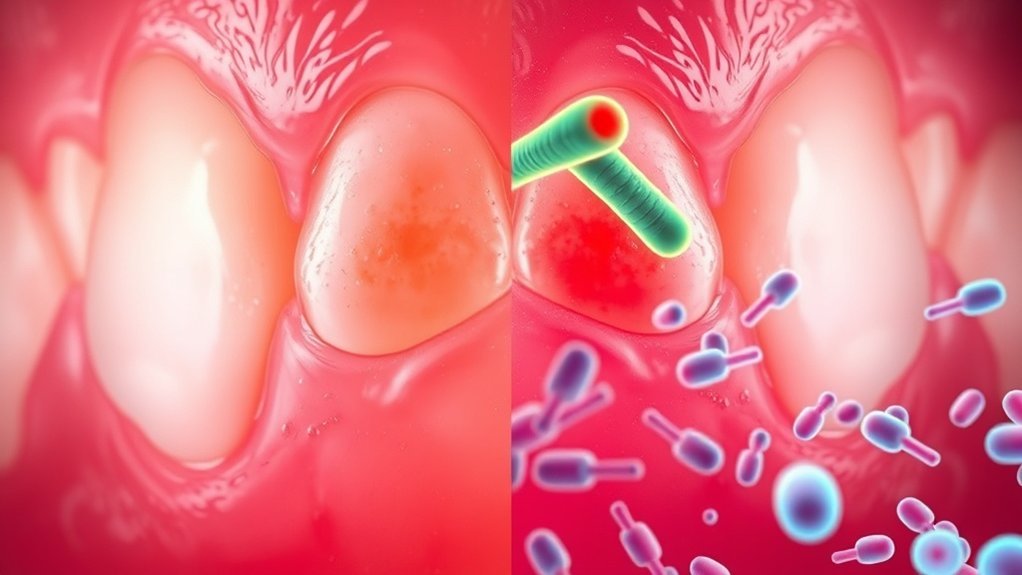How Does Gum Disease Relate to Oral Bacterial Imbalances and Infections
Gum disease occurs when harmful bacteria disrupt the balance of your oral microbiome, leading to infections and chronic inflammation in your gums. This bacterial imbalance can result from poor oral hygiene, an unhealthy diet, or tobacco use. As these pathogens proliferate, they form plaque and tartar, exacerbating gum sensitivity and inflammation. If left untreated, gum disease can have serious consequences for your oral health and overall wellbeing. Understanding this connection is vital for prevention and treatment.
Key Takeaways
- Gum disease begins with gingivitis, where poor oral hygiene causes bacterial imbalances and plaque buildup, leading to inflammation and infection.
- Dysbiosis, or disruption of the oral microbiome, allows harmful bacteria to thrive, increasing the risk of gum disease and subsequent infections.
- Tartar accumulation from plaque creates a breeding ground for pathogenic bacteria, exacerbating gum disease and causing chronic infections.
- Inflammatory cytokines released during gum disease can trigger systemic health issues, linking oral bacterial imbalances to conditions like cardiovascular disease.
- Effective oral hygiene practices are essential to maintain microbial balance, preventing gum disease and reducing the risk of bacterial infections.
Understanding Gum Disease: Types and Symptoms
Gum disease, often overlooked until it progresses, can manifest in several forms, including gingivitis and periodontitis. Gingivitis represents the early stage of gum disease, characterized by inflammation, redness, and swelling of the gums. You might notice bleeding during brushing or flossing, which are early indicators that shouldn’t be ignored. If left untreated, gingivitis can advance to periodontitis, where the inflammation extends deeper into the supporting structures of the teeth. Symptoms may include persistent bad breath, receding gums, and tooth mobility. Recognizing these signs is essential for early intervention. Regular dental check-ups can help identify gum disease before it escalates, allowing for timely treatment and reducing the risk of severe oral health complications.
The Oral Microbiome: A Complex Ecosystem
The oral microbiome is a complex ecosystem where microbial diversity plays a vital role in maintaining oral health. When this balance is disrupted, a condition known as dysbiosis occurs, which can lead to various diseases, including gum disease. Understanding these dynamics is essential for developing effective prevention and treatment strategies.
Microbial Diversity Importance
While many might overlook the significance of microbial diversity, it plays a critical role in maintaining the health of the oral microbiome, a complex ecosystem teeming with various bacterial species. A balanced microbial community prevents oral bacterial imbalances that can lead to diseases like gum disease. Each species contributes to a stable environment, where beneficial bacteria can inhibit pathogenic growth. Understanding this diversity helps in recognizing how disruptions can trigger infections.
| Bacterial Species | Function | Impact of Imbalance |
|---|---|---|
| Streptococcus | Fermentation | Increased plaque formation |
| Lactobacillus | Acid production | Tooth decay risk |
| Actinomyces | Tissue repair | Inflammation escalation |
| Prevotella | Immune modulation | Heightened susceptibility |
| Fusobacterium | Biofilm formation | Gum disease onset |
Dysbiosis and Disease Link
When microbial diversity is disrupted, it often leads to dysbiosis, a condition that greatly impacts oral health. This imbalance encourages the proliferation of pathogenic bacteria within the oral microbiome, forming a complex bacterial biofilm that can undermine periodontal health. Oral pathogens such as Porphyromonas gingivalis and Treponema denticola thrive in this environment, contributing to inflammation and tissue destruction. The presence of these harmful bacteria not only exacerbates gum disease but can also influence systemic health, linking oral infections to conditions like cardiovascular disease and diabetes. By understanding the dysbiosis-disease connection, you can take proactive steps in maintaining microbial diversity through proper oral hygiene and dietary choices, ultimately supporting your overall health.
Causes of Bacterial Imbalances in the Mouth
Bacterial imbalances in your mouth often stem from several key factors. Poor oral hygiene allows harmful bacteria to thrive, while an unhealthy diet can contribute to their proliferation. Additionally, tobacco use greatly disrupts the delicate balance of your oral microbiome, increasing the risk of gum disease.
Poor Oral Hygiene
Poor oral hygiene greatly contributes to bacterial imbalances in the mouth, as neglecting regular brushing and flossing allows harmful bacteria to proliferate. When you fail to maintain proper oral care, dental plaque accumulates on your teeth, creating a breeding ground for pathogenic bacteria. This buildup not only increases the risk of gum disease but also disrupts the natural balance of oral flora. Over time, these imbalances can lead to inflammation, infection, and eventually tooth loss. Additionally, poor oral hygiene can compromise your immune response, making it difficult for your body to combat these bacteria. To prevent these issues, it is crucial to adopt a consistent oral hygiene routine that includes effective brushing and daily flossing.
Diet and Nutrition
Diet and nutrition play a vital role in maintaining the balance of oral bacteria. What you eat directly influences your oral health, as a diet high in sugars and processed foods promotes harmful bacteria growth. These bacteria produce acids that can erode enamel and lead to gum disease. Conversely, a balanced diet rich in fruits, vegetables, whole grains, and lean proteins supports beneficial bacteria, enhancing your oral microbiome. Nutrients like vitamin C and calcium are essential for gum health and can mitigate inflammation. Hydration also plays a notable role, as water helps wash away food particles and bacteria. By making mindful dietary choices, you can greatly reduce the risk of bacterial imbalances and improve your overall oral health.
Tobacco Use Effects
When you use tobacco, you’re not just risking your overall health; you’re also creating an environment in your mouth that fosters harmful bacterial growth. Tobacco use greatly alters the oral microbiome, increasing bacterial virulence and undermining your immune response. This imbalance can lead to gum disease and other infections, complicating your oral health.
| Tobacco Use Effects | Impact on Oral Health |
|---|---|
| Increased bacterial virulence | Higher risk of infections |
| Compromised immune response | Slower healing of gums |
| Dry mouth | More plaque accumulation |
| Altered saliva composition | Enhanced bacterial growth |
The Link Between Gum Disease and Bacterial Infections
Gum disease, characterized by inflammation and infection of the tissues surrounding the teeth, is often a direct result of bacterial imbalances in the oral cavity. When harmful bacteria overgrowth occurs, it disrupts the delicate balance of your oral microbiome, leading to periodontal infections. These infections can cause significant damage to both soft and hard tissues, ultimately affecting tooth stability. You might not notice symptoms initially, but as the condition worsens, you may experience pain, swelling, and even tooth loss. Recognizing the link between gum disease and bacterial infections is essential for effective prevention and treatment. Maintaining good oral hygiene and regular dental check-ups can help you manage bacterial levels and reduce your risk of developing gum disease.
Stages of Gum Disease: From Gingivitis to Periodontitis
Understanding the stages of gum disease is essential for early detection and effective intervention. Gum disease typically begins with gingivitis, characterized by inflammation of the gums, leading to redness, swelling, and bleeding. If left untreated, gingivitis can progress to chronic periodontitis, a more severe form of gum disease. In this stage, the inflammation extends deeper, affecting the supporting structures of teeth, including bone loss. You may notice increased gum recession and pockets forming between your gums and teeth. Recognizing these stages is vital for timely treatment, as chronic periodontitis can result in tooth mobility and loss. Regular dental check-ups and maintaining proper oral hygiene can help prevent the progression of gum disease and its associated complications.
The Role of Plaque and Tartar in Gum Disease Development
Plaque forms when bacteria accumulate on your teeth, creating a sticky film that can lead to gum disease if not removed. As plaque hardens into tartar, it becomes considerably more difficult to remove, exacerbating inflammation and damaging gum tissue. Understanding the relationship between plaque, tartar, and gum health is essential for preventing the progression of periodontal disease.
Formation of Plaque
When bacteria accumulate on your teeth, they form a sticky film known as plaque, which can lead to significant oral health issues if not managed properly. This plaque accumulation occurs when you neglect your oral hygiene routine, allowing bacteria to thrive. As plaque builds up, it produces acids that can erode tooth enamel, leading to cavities and gum disease. If you don’t remove plaque through regular brushing and flossing, it can harden into tartar, complicating the problem. Effective oral hygiene practices, such as brushing at least twice a day and using dental floss, are essential in preventing plaque formation. By maintaining good oral hygiene, you can mitigate the risk of gum disease and preserve your overall dental health.
Tartar’s Impact on Gums
As plaque accumulates and hardens into tartar, it creates a breeding ground for harmful bacteria that can profoundly impact your gums. This tartar buildup can lead to chronic infection and trigger the release of inflammatory cytokines, exacerbating gum disease. When this occurs, you may experience:
- Increased gum sensitivity and pain
- Bleeding during brushing or flossing
- Bad breath that doesn’t go away
Ignoring tartar can result in severe gum issues, including periodontitis, which can affect not just your oral health but your overall well-being. Regular dental cleanings and good oral hygiene practices are essential to prevent tartar formation and maintain healthy gums. Take action now to safeguard your gum health and avoid the painful consequences of untreated gum disease.
Risk Factors Contributing to Gum Disease
Gum disease often arises from a combination of risk factors that can greatly affect oral health. These factors contribute to the formation of biofilm, which harbors pathogenic bacteria, leading to inflammation. When your immune system responds, it produces pro-inflammatory cytokines that can further exacerbate gum issues.
| Risk Factor | Description |
|---|---|
| Poor Oral Hygiene | Inadequate brushing and flossing allow plaque to accumulate. |
| Smoking | Reduces blood flow to gums, impairing healing. |
| Diabetes | Alters immune response, making gums more susceptible. |
| Hormonal Changes | Fluctuations can increase gum sensitivity. |
Understanding these elements can help you take proactive steps to maintain your gum health and prevent disease progression.
Consequences of Untreated Gum Disease on Oral Health
Untreated gum disease can lead to a cascade of oral health issues that extend beyond mere discomfort. If you ignore the signs, you may face serious consequences, including:
- Tooth loss: Bacteria can destroy the supporting structures of your teeth, resulting in inevitable loss.
- Alveolar bone resorption: The jawbone deteriorates as it loses support, affecting your facial structure and overall appearance.
- Increased risk of infections: Untreated gum disease can allow harmful bacteria to enter your bloodstream, posing additional health threats.
These complications highlight the importance of addressing gum disease early. By seeking treatment, you can maintain your oral health, preserve your teeth, and avoid the painful repercussions of neglecting this serious condition. Don’t let gum disease dictate your dental future.
Systemic Health Implications of Gum Disease
While many people view gum disease as a localized oral issue, its impact can extend far beyond the mouth, influencing overall systemic health. Research indicates gum disease can contribute to systemic diseases, including cardiovascular conditions and diabetes. The inflammation caused by periodontal bacteria may trigger harmful responses in other parts of the body, leading to complications. Additionally, the rise of antibiotic resistance complicates treatment, as persistent oral infections may require stronger measures. Understanding these connections is essential for maintaining not just oral health but overall well-being.
| Systemic Disease | Impact of Gum Disease |
|---|---|
| Cardiovascular Disease | Increased risk of heart issues |
| Diabetes | Poor glycemic control |
| Respiratory Disease | Higher susceptibility to infections |
| Rheumatoid Arthritis | Exacerbation of symptoms |
| Pregnancy Complications | Higher risk of preterm birth |
Preventive Measures and Treatment Options for Gum Disease
Maintaining oral health is essential, as effective preventive measures and treatment options for gum disease can greatly reduce the risk of both localized and systemic complications. Regular dental cleaning is vital, helping to remove plaque and tartar buildup. Here are some preventive measures you should consider:
- Daily brushing and flossing: Keep your teeth and gums healthy by removing debris and plaque.
- Routine dental check-ups: Stay ahead of potential issues with professional assessments and cleanings.
- Healthy lifestyle choices: A balanced diet and quitting smoking can strengthen your immune system.
If gum disease occurs, treatments may include deep cleanings, scaling, or even surgical options, depending on severity. Prioritize your oral health to maintain overall well-being.
Frequently Asked Questions
Can Gum Disease Affect My Overall Mental Health?
Yes, gum disease can affect your overall mental health. Inflammation and pain from periodontal issues may contribute to anxiety and depression, impacting your emotional well-being. Maintaining oral health is essential for both physical and mental wellness.
How Does Stress Influence Gum Disease Progression?
Stress can exacerbate gum disease, with studies showing that 70% of individuals under chronic stress experience worsening oral health. It weakens your immune response, allowing bacteria to thrive, leading to increased inflammation and gum deterioration.
Are There Specific Diets That Help Prevent Gum Disease?
Yes, diets rich in antioxidants, vitamins C and D, omega-3 fatty acids, and fiber can help prevent gum disease. Incorporating fruits, vegetables, nuts, and fish into your meals supports oral health and reduces inflammation.
Can Smoking Impact My Oral Bacterial Balance?
Yes, smoking noticeably disrupts your oral bacterial balance. Studies show smokers are 3.6 times more likely to develop gum disease. This imbalance can lead to infections, affecting not just your mouth, but overall health too.
How Often Should I Visit the Dentist for Gum Disease Prevention?
You should visit the dentist at least twice a year for gum disease prevention. Regular check-ups help detect early signs, allowing for timely intervention and effective management of your oral health and bacterial balance.
Conclusion
Ultimately, gum disease isn’t just an oral concern; it’s a signal of deeper bacterial imbalances that can lead to serious infections. As you navigate the stages from gingivitis to periodontitis, remember that neglecting these issues can have far-reaching consequences for your overall health. The question remains: Are you prepared to face the potential implications of untreated gum disease? Taking preventive measures today could be the key to safeguarding your oral and systemic health tomorrow.






